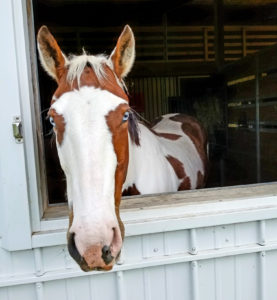At UCC-related Hoffman Homes, Horses Help Youth Overcome Trauma Experiences

Magee is the newest addition to the Hoffman Homes’ equine-assisted therapy program.
Among the first things people notice about Magee are his stunning blue eyes and gentle nature. Magee, an 8-year-old registered American Paint horse, is the newest member of the Equine-Assisted Therapy program at UCC-related Hoffman Homes for Youth in Littlestown, Pa. On June 25, Magee completed his trial period and officially became part of the herd.
Equine-assisted therapy is one of several animal-assisted therapy programs at Hoffman Homes, whose campus houses and treats children with severe mental health diagnoses and behavioral issues due to trauma, abuse, neglect and loss. The six therapy horses in the program live on HHY’s 192-acre property in a nine-stall barn. The grounds include seven pastures for turn-out and an indoor riding arena for riding sessions and horse-handling activities.
The program is divided into two parts. For the first 10 weeks, children who sign up for the first time work in small groups of two or three and learn the basics of grooming, caring for and handling the horses, and understanding the horse’s body language. After that, participants are moved into one-on-one riding sessions where they learn basic and intermediate riding skills.
Says one Hoffman youth, “Horse therapy makes me happy.” Says another, “The horses don’t boss me around like some bullies have done to me.”
Hanna Bishop, the equine-assisted therapy coordinator, says the program fills a unique need. “I believe that through work with our equine partners, our children have the opportunity to learn and practice life skills and self-control, build self-esteem and leadership skills, learn about team work, and what it means to be part of a partnership,” she says. “The horses offer a shoulder to lean on or an ear to listen.”
It’s this emphasis on the relationship with the horse that is key, Bishop adds. The horses “don’t judge, they don’t bully, and they don’t hold grudges. They offer natural consequences for aggressive tone, volume and movement. It is only through safety and self-control that the relationship can be built and maintained.”
Of the six horses in the program, five are leased to Hoffman Homes by members of the community. Magee, for example, is on full lease from Steve Brown at Ponie Up LLC in New Oxford, Pa. Each horse goes through a 45-day period of testing and evaluation before becoming a permanent member of the herd. The exception is Copper, the oldest horse in the program. Now semi-retired at the age of 30, Copper was donated to the program in the early 2000s and will live out his life at Hoffman Homes. The other horses stay in the program as long as it is beneficial to the horse, the program, and the owners.
What is it about the horses that help the youth so much? “There is a simplicity in the animal-human relationship,” says Jennifer Sepic, supervisor of creative therapies and animal-assisted therapy coordinator. “Animals are not as threatening as human beings. They don’t talk back, give unwanted advice, scold, judge, or belittle. There’s a high level of acceptance and understanding.”
That understanding and natural connection helps the children and youth feel more at ease, and able to open up more, express their feelings, and reflect on their trauma history, Stanley adds.
As one Hoffman youth recounts, “[The horses] make me feel like who I want to be. I can be myself around them.”
In addition to horses, Hoffman Homes also offers therapy sessions that can include cats, dogs, rabbits, guinea pigs, ferrets, goats, or chickens. Such animal-assisted therapies not only help children improve socialization, communication, confidence, responsibility and self-control; they also help them deal with grief and loss, reduce anxiety and self-injurious behaviors, and reduce feelings of isolation, boredom, and loneliness.
As one equine-assisted therapy program participant puts it, “I like that you get to take care of the horses. You don’t just ride a horse, you learn to take care of them. I feel really excited to work with a horse every week because it’s really fun.”
Or, as Bishop observes, “I believe that the reason that this type of therapy works is because it doesn’t feel like therapy at all.”
Join Our Mailing LIst
"*" indicates required fields
